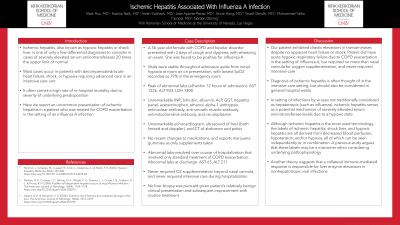Back


Poster Session B - Monday Morning
Category: Liver
B0616 - Ischemic Hepatitis Associated With Influenza A Infection
Monday, October 24, 2022
10:00 AM – 12:00 PM ET
Location: Crown Ballroom

Has Audio
.jpg)
Mark Hsu, MD
Kirk Kerkorian School of Medicine at UNLV
Las Vegas, NV
Presenting Author(s)
Mark Hsu, MD, Katrina Naik, MD, Amith Subhash, MD, Jose Aponte-Pieras, MD, Annie Hong, MD, Yousif Elmofti, MD, Muhammad Talha Farooqi, MD, Gordon Ohning, MD, PhD
Kirk Kerkorian School of Medicine at UNLV, Las Vegas, NV
Introduction: Ischemic hepatitis is one of the few differential diagnoses to consider in cases of severely elevated serum aminotransferases 20 times the upper limit of normal. Given the inherently robust nature of the liver despite ischemic states, ischemic hepatitis usually presents in patients requiring advanced care in an intensive care unit, and often carries a high rate of in-hospital mortality. Moreover, most cases occur in patients with underlying heart failure. Here we report a case of ischemia hepatitis in a patient not requiring intensive care and without apparent heart failure, who was successfully treated for COPD exacerbation in the setting of an influenza A infection.
Case Description/Methods: A 56-year-old female with COPD presented with 3 days of dyspnea with SpO2 as low as 79% on room air. She tested positive for influenza A. She was incidentally found to have elevated aminotransferases, which peaked within 12 hours of admission, with AST of 1226 IU/L and ALT of 943 U/L, and LDH of 1300 U/L. She had unremarkable INR, bilirubin, albumin, ALP, and GGT. Hepatitis panel, acetaminophen, ethanol, alpha-1 antitrypsin, antinuclear antibody, anti-smooth muscle antibody, antimitochondrial antibody, and ceruloplasmin were also all unremarkable. CT and ultrasound of the abdomen did not suggest underlying liver disease, and echocardiogram did not suggest any heart dysfunction. She denied any recent changes to her medications but did take marijuana gummy supplements. Her aminotransferases drastically fell with standard treatment of COPD exacerbation. Oxygen supplementation was limited to nasal cannula only, and she never required intensive care. At discharge, the patient's AST was 63 IU/L and ALT was 211 U/L.
Discussion: Although ischemic hepatitis is a rare diagnosis primarily diagnosed in the intensive care setting, it can be infrequently seen in the hospital ward when patients demonstrate serum aminotransferases 20 times the upper limit of normal. In the setting of infections by viruses not traditionally considered as hepatotropic, ischemic hepatitis serves as a potential mechanism for severe serum aminotransferase elevations due to a hypoxic state. Furthermore, recent research suggests that an immune-mediated response to viral infection, and not hypoxia, is what primarily drives the aminotransferase elevation.
Disclosures:
Mark Hsu, MD, Katrina Naik, MD, Amith Subhash, MD, Jose Aponte-Pieras, MD, Annie Hong, MD, Yousif Elmofti, MD, Muhammad Talha Farooqi, MD, Gordon Ohning, MD, PhD. B0616 - Ischemic Hepatitis Associated With Influenza A Infection, ACG 2022 Annual Scientific Meeting Abstracts. Charlotte, NC: American College of Gastroenterology.
Kirk Kerkorian School of Medicine at UNLV, Las Vegas, NV
Introduction: Ischemic hepatitis is one of the few differential diagnoses to consider in cases of severely elevated serum aminotransferases 20 times the upper limit of normal. Given the inherently robust nature of the liver despite ischemic states, ischemic hepatitis usually presents in patients requiring advanced care in an intensive care unit, and often carries a high rate of in-hospital mortality. Moreover, most cases occur in patients with underlying heart failure. Here we report a case of ischemia hepatitis in a patient not requiring intensive care and without apparent heart failure, who was successfully treated for COPD exacerbation in the setting of an influenza A infection.
Case Description/Methods: A 56-year-old female with COPD presented with 3 days of dyspnea with SpO2 as low as 79% on room air. She tested positive for influenza A. She was incidentally found to have elevated aminotransferases, which peaked within 12 hours of admission, with AST of 1226 IU/L and ALT of 943 U/L, and LDH of 1300 U/L. She had unremarkable INR, bilirubin, albumin, ALP, and GGT. Hepatitis panel, acetaminophen, ethanol, alpha-1 antitrypsin, antinuclear antibody, anti-smooth muscle antibody, antimitochondrial antibody, and ceruloplasmin were also all unremarkable. CT and ultrasound of the abdomen did not suggest underlying liver disease, and echocardiogram did not suggest any heart dysfunction. She denied any recent changes to her medications but did take marijuana gummy supplements. Her aminotransferases drastically fell with standard treatment of COPD exacerbation. Oxygen supplementation was limited to nasal cannula only, and she never required intensive care. At discharge, the patient's AST was 63 IU/L and ALT was 211 U/L.
Discussion: Although ischemic hepatitis is a rare diagnosis primarily diagnosed in the intensive care setting, it can be infrequently seen in the hospital ward when patients demonstrate serum aminotransferases 20 times the upper limit of normal. In the setting of infections by viruses not traditionally considered as hepatotropic, ischemic hepatitis serves as a potential mechanism for severe serum aminotransferase elevations due to a hypoxic state. Furthermore, recent research suggests that an immune-mediated response to viral infection, and not hypoxia, is what primarily drives the aminotransferase elevation.
Disclosures:
Mark Hsu indicated no relevant financial relationships.
Katrina Naik indicated no relevant financial relationships.
Amith Subhash indicated no relevant financial relationships.
Jose Aponte-Pieras indicated no relevant financial relationships.
Annie Hong indicated no relevant financial relationships.
Yousif Elmofti indicated no relevant financial relationships.
Muhammad Talha Farooqi indicated no relevant financial relationships.
Gordon Ohning indicated no relevant financial relationships.
Mark Hsu, MD, Katrina Naik, MD, Amith Subhash, MD, Jose Aponte-Pieras, MD, Annie Hong, MD, Yousif Elmofti, MD, Muhammad Talha Farooqi, MD, Gordon Ohning, MD, PhD. B0616 - Ischemic Hepatitis Associated With Influenza A Infection, ACG 2022 Annual Scientific Meeting Abstracts. Charlotte, NC: American College of Gastroenterology.
